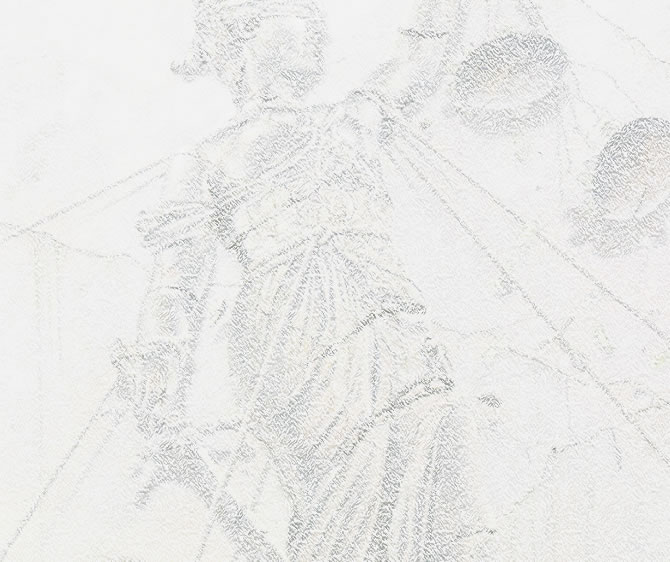Our first historical topic is traditional Western theories of law. We begin with “Natural Law.” The doctrine of natural law emerged during the Roman Empire. Roman jurists analyzed the laws of their conquered peoples. They distinguished between the local and imperial law and then evolved a theory of ius naturale—the “natural justice” binding on all peoples. Some supposed the motivation for this doctrine was the empirical observation that there were common elements in the codes of all the conquered peoples (Europe, Northern Africa and Middle East).
Stoic philosophers had shaped the Greek idea of reason into a quasi-religioon. They “worshipped” reason (or, one could say, they identified God as the embodiment of reason—a form of pure rationality). Plato had made Reason the source of the order in the universe. Everything that happened was “rational.” For philosophers, as for Plato and Aristotle, “rational” also meant morally right, so, they concluded, whatever does happen, ought to happen. This led them to the philosophy of resignation that took their name--stoicism. To be stoic is to be fatalistic and accept reason (fate) as right. It is a law of reason that this-now should be as it is and we, as rational creatures, should align our own thought with this divine reason‑‑the course of nature. Hence we accept everything that happens as right.
Cicero was a Roman Stoic. He argued that ‘law’ was a continuum. God's law governed natural events, morality, and political regulations. All were all parts of the same total system of reason—rational law. So, government legislation (positive law) cannot contravene reason and still be regarded as ‘law’. No law can disagree with natural law. Legislation that does is not legitimate or binding—because there is no reason for it. If the total rational law has all parts integrated, then any actual legislation that is law must be consistent with all the rest, including rational ethics or morality.
This doctrine fed easily into Christianity with its Greek-derived, God-based ethical theory. It also and gave the church a measure of power over rulers. God was the perfectly rational creator of the world. The laws of physics were God’s laws--as were the moral laws. God is the embodiment of rational purpose in the Universe. All valid law manifests its workings and must be ultimately consistent. The moral law is a rational account of our place and purpose in the overall scheme of God’s plan for the universe. Any legislation by secular states that violates such is not valid or binding law.
Natural law, especially if we identify it with its central doctrine, "morality is rational," has an enormous and complex history that takes it far beyond its implications for legal theory. Contrary to the "legalist" critics of natural law in jurisprudence, many viable ethical theories today accept some of the core doctrine (minus the appeal to God). It amounts to a kind of ethical realism or cognitivism about morality. Subjectivism or relativism in ethics is the natural opposite of this core, and, among theorists today, the field is evenly divided (although philosophers have analyzed the positions so the differences between them are much more subtle). Neither is obviously true or false. However, as a doctrine in legal theory specifically, natural law theory has deep problems. Someone may believe that morality is rational and that laws that contravene morality are immoral, bad, wicked, are not to be followed and yet accept that they are valid but wicked laws.
In the history of legal theory, we focus on Aquinas as the canonical formulator of this Natural Law view. We should not assume that all natural law theories make the same assumptions he does. Still, his is interesting and even more sophisticated than his positivist critics usually allow.
Aquinas draws his version of Natural law theory by blending Platonistic Christianity with Aristotle. Aristotle introduced the notion of a thing’s “final” cause. That was a kind of goal that “existed” in the thing as it was born (what we might now call its genetic potential). Aristotle called this goal the thing's entelechy or essence. It was the thing’s purpose, its goal, and part of its rational definition as well as an explanation of its growth and development. His metaphysics was a kind of natural teleology where the explanation of things consisted in appreciating their “ends” or the purposes implicit in their constitution—the reasons (God’s?) for making them so.
Christianity adapted Aristotle’s doctrine by saying that all of creation was for God's purpose. The purpose is in each thing was its drive to grow to achieve whatever God impelled it to be. This ran “natural” and “rational” together via God’s role as an omnipotent, rational creator.
This suggests, in modern terms, that our moral obligations are continuous with the DNA that directs our growth. Just as we naturally grow to be attracted to the opposite sex (mostly), have children, raise them, etc. so we grow to be citizens of states, truthful, keep promises, help those in need. Nature has written all these into our purpose as beings. The moral law is promulgated into our human nature.
The metaphysical and religious details are different, but the overall position is not unlike that of 孟子 Mencius, who regards morality as natural inclinations built into the heart. Mencius does not appeal to a divine account of this, but a quasi-naturalistic account. Basically, this is because the 氣qibreath that 天 tiannature:sky instills in us has moral structure. We are a continuous and integrated part of cosmic 氣qibreath. Our hearts are thus "patterned" (later Confucians called this pattern 理 litendency ) with the corresponding inclinations to action. Human moral action both contributes to the harmony of nature and is the most “natural” action available to us.
If you add to either view the empirical discovery that the laws of all societies prohibit pretty much the same things, it is easy to see how the doctrine would apply to legal theory. We declare those things illegal because it is our nature to do so. It is thus rational and right to do so.
In the West, however, the notion of “rational” brought in some other crucial differences. On the one hand, philosophers linked it to the notion of eternal constancy or truth. On the other, we linked it to a process of practical reason that every person uses in voluntary action. We should base practical reason on universal maxims and objective facts. The conclusion of a practical “syllogism” is an action. The Aristotelian conception of humans as rational beings is of humans as proof or argument driven. Law is in us as a requirement of this kind of reason. In Mencius, it is pure inclination to action, not a deductive process and intuitions about moral laws.
Aquinas sees the universe as governed by divine reason‑‑the continuum again. Eternal law imprinted on each thing as its inclination to proper acts and ends. (For example, water seeks its own level.) In humans who are the only ‘rational’ animals, the law is imprinted as principles and capacities to infer to action. What we call “natural law” (essentially real morality) is that part of eternal divine law that is accessible to our finite limited reason as principles or maxims.
Aquinas holds to the classic natural law validity claim. Human law is valid law only insofar as it is consistent with divine law. We can know some of divine law only by revelation through the church. Thus, the church is “over” the state and the state cannot make law something of which the Church disapproves. But the state should also make its laws consistent with the part of divine law that every person knows through pure reason. Thus moral criticism of law implies that the law is not binding or valid. We need not obey it and government should not enforce it.
However, Aquinas allows some leeway. First, the legal system does not have to enact all of natural law. Some things are morally evil that still should not be prohibited by law. The only parts of natural law that human rulers should promulgate as law are the rules of interpersonal behavior. It is not necessary for there to be penal rules protecting people from doing wrong to themselves (e.g., laws against gluttony or private drunkenness). Further, the law should prohibit only those things from which most human beings can abstain. That is, the Church thinks sex is bad, but we cannot expect any except the most pious to totally abstain from sex. Thus, it should not be against the law.
On the other side, some things can be part of human law, though no natural (moral) law forbids it. That is, the government may prohibit acts that are morally permitted. This is because natural law leaves out a lot of detail. There is nothing “natural” about whether we should drive on the left or right side of the road. However, we do have to have some rules in society. Since reason leaves both options open (permits both), human law can opt to mandate either. Thus, human law can be suited to local conditions and have “determinations” that natural law does not entail. The determinations are consistent with, but not implied by moral principles.
Subject to those exceptions, however, promulgations that conflict with natural morality are not law. A state cannot require a subject to do what is morally (religiously) wrong.
Aquinas defines law as “an ordinance of reason, for the common good, governing interpersonal behavior from which all can abstain, promulgated by him who has care of the community.” Natural law, he says, is promulgated by its being innate and since always innately known, binding insofar as known. Law is a sub‑branch of morality, which is a sub‑branch of religion (human law ß natural law ßdivine law).
The legal part of the doctrine has had a rich and important history in the West. It functioned to justify opposition to law during the democratic revolutions in Europe and America. Revolutionaries appealed to the notion in wording the declarations of both the American and French Revolutions. “We hold these truths to be self-evident: that all men are created equal, that they are endowed by their creator with certain inalienable rights . . . .” The Allies appealed to the doctrine when it conducted war crimes trials at the end of World War II. It fueled civil disobedience against slavery in America and against the Vietnam war.
Some distinguish one doctrine as a narrow variant of natural law–the doctrine of natural rights. It does not appeal to the whole of God’s reason or rule out all immoral laws. Still, it does rule out as invalid any law that violates “natural” rights. A natural right is one that we can all “rationally” recognize as inherent in our conception of ourselves as persons or as rational moral agents.
Most law professors and discussants treat natural law as a kind of metaphysical (or religious) nonsense and a thoroughly discredited theory. Besides its reliance on theology, several formal problems confront it as a competent theory of law. First, the doctrine entails a kind of inflexibility in the law. If the only valid laws are laws of reason, then they ought never to change (much). “Law” seems eternally fixed and only the locally necessary "determinations" can vary from state to state. Deductions from principles can vary as much as facts vary so there may be some large differences, but we would have to justify them in the facts. One could not simply appeal to the different legal history. Law would still be like morality in this regard. Usually, however, we think of this as one of the distinctions between the two prescriptive language games.
Second, critics allege that natural law theory confuses the existence of a law with the goodness of a law. Anti-naturalists insist this is incoherent. It requires them to talk of a law that is not a law. However, natural law theory can make use of the notion of a valid or binding law and distinguish it from purported or attempted laws that do not succeed. In the American constitutional system, the courts must speak this way all the time when they find a law unconstitutional. Technically, they are finding that the “law” it is not law. We can understand this as an attempt by the legislature and executive to make a law that, for formal, constitutional reasons failed to have legal effect. While natural law may thus escape incoherence, it does seem unrealistic to say there cannot be evil law. By contrast, it is a truism in constitutional systems that there cannot be an unconstitutional law.
A third criticism is a watered down version of the first. Critics accuse natural law theory of questionable metaphysics because it commits the "is-ought" fallacy. It is an attempt to derive what ought to be from observing what is. That this really is a fallacy is still controversial in ethics. However, G. E. Moore made an influential observation. For any descriptive mark of right we may offer (like causing pleasure, or being in accord with our nature) we can sensibly and seriously raise the question if we ought to seek for pleasure or conform to our nature. It seems we need more than the mere metaphysical premises to derive any moral consequence.
The fourth criticism is similarly a version of the second, that natural law theory confuses law and morality. It is a strong one. Critics insist that Natural law theory leads to “law worship” and invites the mistake of treating the law as continuous with and as important as morality. We should treat morality as more important, not as merely the same thing. We would be clearer on the conflicts if we openly formulated it so that laws could be simply immoral. We must (morally) then oppose them though they are clearly laws.
Traditional natural law theory is not very popular today though there are still some clever defenders around. Stronger theories are available that can do justice to the valid insights of Natural law theory without running into the complaints of incoherence and lack of rational motivation. Before we leave it, we have to acknowledge its main recognized strengths. It seems to have been important in two areas of the normative theory of law: the theory of legislative justice and the theory of compliance. It did give a rationalization to legislators to avoid making certain kinds of laws and to the people to resist and refuse to obey certain wickedly unjust laws. Sometimes it aided even the courts to make “morally sound” decisions. We could reasonably hope that any alternative theory would have these merits.
 |
|||||
 |
 |
 |
|||
 |
|||||
 |
 |
 |
|||